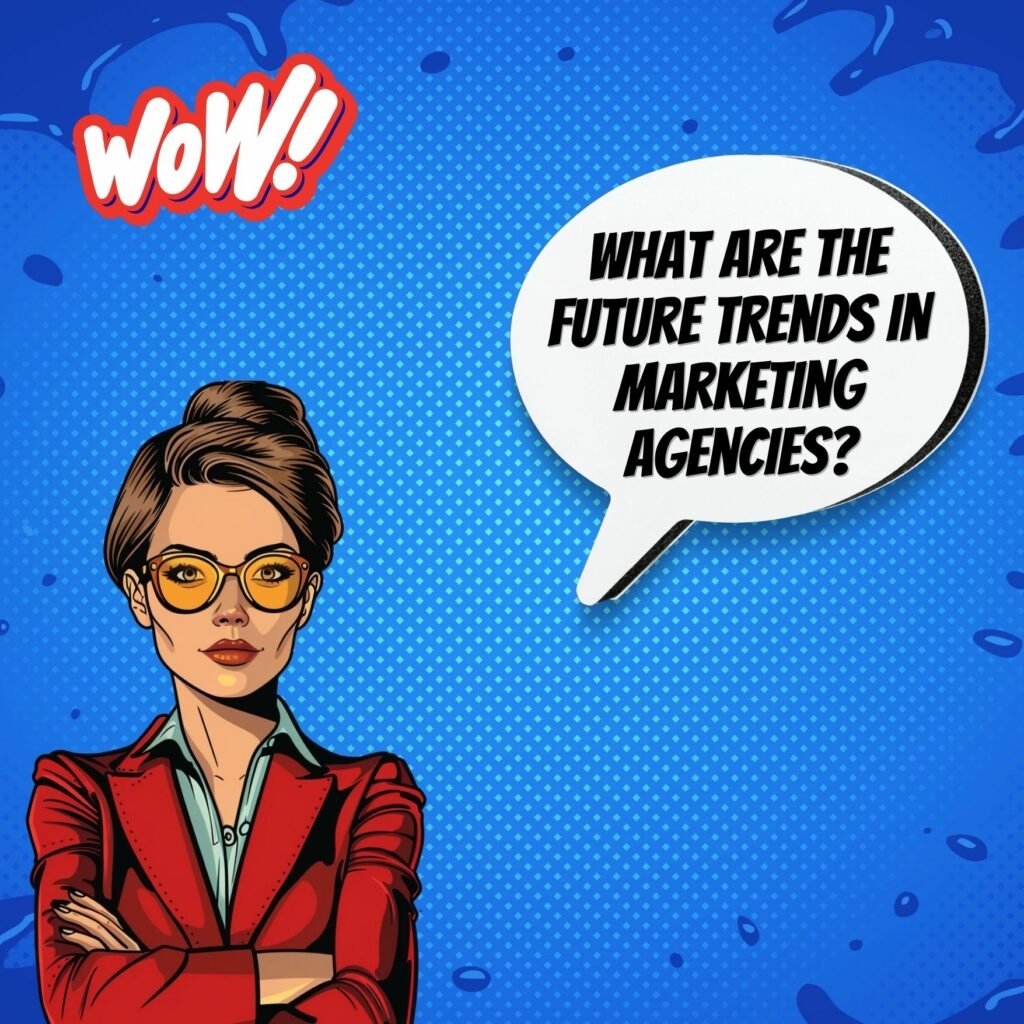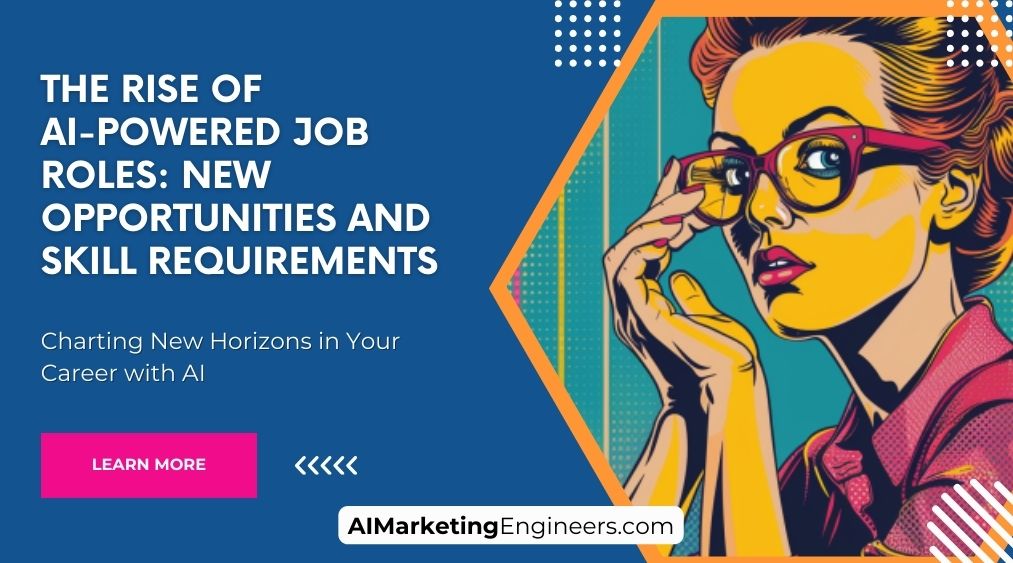Key Takeaways
✅ Embracing AI and Personalization: As AI continues its rise in the marketing world, it is crucial for agencies to include it in their strategies. AI can enhance market research, streamline content creation, and improve user experiences. Personalization through data and analytics will also be essential to meeting unique customer needs.
✅ Rise of Immersive Experiences and Short-Form Video Content: Virtual and augmented reality technologies are expected to create more engaging customer experiences. Likewise, short-form video content is predicted to keep gaining traction, offering high engagement rates and considerable return on investment.
✅ Agility and Employee Activation: To succeed in the ever-evolving digital marketing landscape, agencies need to be agile and adaptable. Empowering employees to produce and share content that reflects the brand’s voice will not only boost marketing efforts but also build a strong company culture.

Introduction
The marketing landscape is constantly evolving, and staying ahead of the curve is essential for business growth. Marketing agencies are at the forefront of this transformation, adapting to new technologies, consumer behaviors, and market demands. As businesses seek innovative ways to connect with their audiences, understanding the future trends in marketing can provide a strategic advantage.
In the coming years, marketing agencies will increasingly leverage artificial intelligence, data analytics, and personalized content to deliver more effective and targeted campaigns. These advancements will not only enhance customer engagement but also drive higher ROI. By staying informed about these trends, businesses can partner with marketing agencies to create dynamic strategies that foster growth and ensure long-term success.
Top Statistics
| Top Statistics | Insight |
|---|---|
| Digital Marketing Agency Industry Growth: The industry is projected to grow at a CAGR of 6.1% from 2018 to 2023, reaching a market size of $88 billion by 2023. | This highlights the steady expansion of the digital marketing sector, illustrating its increasing importance to business success. |
| Shift to Digital Advertising: Businesses are increasingly shifting from traditional advertising to digital advertising. | A significant trend showing the declining reliance on traditional advertising, pushing agencies to reinvent and innovate. |
| AI in Marketing: AI is driving marketing industry growth but still faces barriers like job security concerns and a lack of knowledge on usage. | The adoption of AI presents both opportunities and challenges, emphasizing the need for education and strategic implementation in marketing. |
| Social Media Apps: These platforms are evolving into frictionless ecommerce platforms, potentially driving higher ROI for marketers. | Marketers need to leverage social media's multi-purpose functionality to boost sales and engagement. |
| Digital Marketing Spending: Businesses continue to recognize the importance of digital marketing, leading to increased spending in this area. | The continued rise in digital marketing investments reflects its critical role in modern business strategy. |
Embracing Virtual and Augmented Reality
The use of Virtual Reality (VR) and Augmented Reality (AR) in marketing is transforming how brands engage with customers. For example, Etsy's Virtual House allows customers to visualize products in a realistic setting, enhancing the shopping experience. This integration not only aids in product visualization but also boosts customer confidence and satisfaction. Will we see a broader adoption of these technologies across different sectors? Statistics indicate that the VR and AR market is expected to grow to $209.2 billion by 2022, underscoring their potential. Additionally, VR and AR can create immersive brand experiences that differentiate a business from competitors. They also enable virtual try-ons, reducing return rates and improving customer satisfaction. As technology advances, the cost of implementing VR and AR solutions is decreasing, making them more accessible to businesses of all sizes.
Focus on Sustainability and Ethical Marketing
Today's consumers are more conscious of their environmental and social impact, which reflects in their purchasing decisions. As a result, marketing agencies are increasingly focusing on sustainable and ethical practices. Brands that commit to eco-friendly initiatives and social responsibility often see enhanced customer loyalty. Are we witnessing a permanent shift towards this type of marketing? Notably, a recent survey found that 66% of global consumers are willing to pay more for sustainable offerings. Furthermore, transparent and authentic communication about sustainability efforts can strengthen brand trust. Companies that incorporate ethical practices into their core values often enjoy a competitive edge. By aligning with consumer values, businesses can also attract a more dedicated and engaged customer base.
Leveraging AI-Driven Interactions
AI is reshaping the marketing landscape with innovations like conversational marketing. Companies are leveraging AI to create personalized and targeted campaigns, enhancing customer engagement. Tools like chatbots provide real-time customer support, improving the overall customer experience. How will these advancements impact traditional marketing strategies? With the global conversational AI market projected to reach $13.9 billion by 2025, the possibilities seem vast and promising. AI can also analyze vast amounts of data to uncover insights that drive more effective marketing strategies. Predictive analytics enable businesses to anticipate customer needs and tailor their offerings accordingly. Additionally, AI-driven personalization can lead to higher conversion rates and customer satisfaction.
Power of Short-Form Video Content
Short-form video content on platforms like TikTok is rapidly gaining traction. This format is not only engaging but also highly effective in driving Return on Investment (ROI). Are brands leveraging this medium to its full potential? According to recent studies, videos shorter than two minutes get the most engagement. Brands that can master the art of storytelling in this condensed format are likely to see significant benefits. Short-form videos can quickly convey key messages and capture audience attention in an era of decreasing attention spans. They are also highly shareable, increasing the potential for viral content. By incorporating short-form videos into their strategies, brands can enhance their social media presence and reach broader audiences.
Importance of Data-Driven Personalization
The ability to generate personalized experiences hinges on robust data and analytics capabilities. Marketing agencies must invest in these tools to create campaigns that resonate with target audiences. How crucial is data in optimizing these efforts? A report by McKinsey states that personalized marketing can lift sales by 5% to 15% and increase marketing ROI by 10% to 30%. Personalized marketing fosters stronger connections with customers by addressing their specific needs and preferences. It also enhances customer loyalty and lifetime value by providing relevant and timely offers. Furthermore, data-driven insights can help identify emerging trends and opportunities, enabling more proactive marketing strategies.
Rise of Social Shopping
Social shopping is emerging as a powerful trend, particularly on platforms like Instagram and TikTok. Marketing agencies need to create engaging social media content and tap into influencer marketing to capitalize on this trend. How is social shopping changing the retail landscape? Estimates suggest that social commerce sales in the U.S. will increase by 34.8% this year to $36.09 billion, highlighting the sector's robust growth. Social shopping allows consumers to discover and purchase products seamlessly within social platforms. It also leverages user-generated content and reviews to build trust and authenticity. By integrating social shopping into their strategies, brands can enhance customer engagement and drive sales.
Evolving Search Engine Optimization Strategies
SEO remains a cornerstone of digital marketing strategies. Agencies must adopt a comprehensive approach that includes optimizing various media types like photos and videos. How is the evolving landscape of SEO affecting marketing strategies? Google's emphasis on user experience and page speed means that agencies must pay attention to all facets of their websites to rank well in search results. Voice search optimization is also becoming increasingly important as more consumers use smart speakers and mobile assistants. Local SEO strategies are essential for businesses targeting specific geographic areas. Regularly updating and refreshing content can also improve search rankings and drive more organic traffic.
Role of Technology and Automation in Marketing
Investment in technology and automation is becoming a fundamental aspect of modern marketing. Tools like Google Analytics and Facebook Ads are invaluable for understanding customer behavior and optimizing campaigns. What role will automation play in the future of marketing? Organizations are increasingly relying on these technologies to streamline their operations and achieve better results. Marketing automation can enhance efficiency by automating repetitive tasks such as email campaigns and social media posting. It also enables more precise targeting and personalization, leading to higher engagement rates. By leveraging automation, businesses can scale their marketing efforts and focus on strategic initiatives.
Digital Transformation with New Technologies
Agencies must stay up to date with new technologies such as web development and social media marketing. The embrace of AR, VR, and AI is also crucial. Is the industry ready to keep pace with these rapid changes? Those who can seamlessly integrate these technologies into their strategies are likely to stay ahead of the curve. Digital transformation enables businesses to create more engaging and interactive experiences for their customers. It also improves operational efficiency and agility, allowing companies to respond quickly to market changes. By investing in new technologies, agencies can provide innovative solutions that drive business growth.
Personalized and Purpose-Driven Marketing
The rise of big data and AI allows for more targeted campaigns. Coupled with a focus on purpose-driven marketing, these trends help brands align with consumer values. How important is it for brands to stay authentic? Purpose-driven marketing not only resonates deeply with consumers but also builds long-term brand loyalty. Consumers are increasingly looking for brands that stand for social and environmental causes. Authenticity in marketing efforts ensures that messages are genuine and relatable. By integrating purpose-driven initiatives into their core strategies, brands can create meaningful connections with their audiences.
Continued Importance of Data and Analytics
The value of data in assessing campaign effectiveness cannot be overstated. Real-time analytics are critical for optimizing marketing strategies. How can agencies leverage these insights? Investing in strong data analytics capabilities can provide actionable insights, leading to more effective and efficient campaigns. Data-driven decision-making enables businesses to allocate resources more effectively and maximize ROI. Advanced analytics can also identify customer segments and behaviors, informing more targeted marketing efforts. Continuous monitoring and analysis of campaign performance allow for agile adjustments and improvements.
Future of Creative Agencies
In a rapidly evolving landscape, the future of creative agencies lies in innovation and collaboration. Using technology to craft engaging, personalized, and purpose-driven campaigns will be key. Which agencies are best poised for success? Those that can adapt, embracing change and new technologies, will undoubtedly lead the charge. Creative agencies must foster a culture of continuous learning and experimentation. Collaboration with other industry experts and technology partners can drive innovation. By staying at the forefront of industry trends, creative agencies can deliver exceptional value to their clients and achieve sustained success.
AI Marketing Engineers Recommendation
Recommendation 1: Integrate AI-Driven Personalization in Your Campaigns: AI-driven personalization has proven to be a game-changer in marketing. According to a report by McKinsey, personalized marketing can deliver five to eight times the ROI on marketing spend and lift sales by 10% or more. Utilize AI tools to analyze customer data and segment your audience to create highly targeted, personalized content. This level of customization not only increases engagement but builds stronger customer loyalty.
Recommendation 2: Leverage Predictive Analytics for Tailored Marketing Strategies: Predictive analytics is becoming increasingly vital for crafting precise marketing strategies. By analyzing current and historical data, predictive models can forecast future customer behaviors and trends. Gartner highlights that organizations that leverage predictive analytics achieve a 15-20% increase in marketing effectiveness. Implementing these insights allows businesses to allocate resources more efficiently, targeting the right audience at the optimal time, thereby maximizing marketing spend and outcome.
Recommendation 3: Adopt Voice Search Optimization for Enhanced Consumer Reach: With the rise of voice-activated devices, voice search optimization is essential to stay relevant. According to Comscore, 50% of all searches will be voice searches by 2022. Ensuring your content is optimized for voice queries can significantly improve your visibility and reach. Use natural language processing (NLP) tools to identify common voice search phrases and integrate them into your content strategy. This alignment can enhance your SEO efforts, making your business easier to find through voice search, which is especially crucial as more consumers begin to use these devices for their search needs.
Relevant Links
- Revolutionize Your Marketing with AI
- Setting Impactful Campaign Goals and Marketing Objectives
- Custom Campaigns and Targeted Messaging
- Boosting Your Ad Campaigns with Ad Rotation and Variation Testing
Conclusion
The future of marketing agencies is poised for a significant transformation, driven by rapid technological advancements and evolving consumer expectations. The integration of Virtual and Augmented Reality (VR and AR) is redefining customer experience and brand engagement, with initiatives like Etsy's Virtual House setting the stage. The shift towards sustainability and ethical marketing highlights the increasing importance of environmentally and socially responsible practices, mirroring consumer demands for transparency and integrity. As AI-driven interactions and conversational marketing gain traction, agencies are expected to leverage these technologies for highly personalized and targeted campaigns. The rise of short-form video content, particularly on platforms like TikTok, underscores the value of quick, engaging media in capturing audience attention and driving return on investment (ROI).
Data and analytics remain cornerstone elements in crafting tailored marketing strategies, emphasizing the necessity for agencies to develop robust analytical capabilities. Additionally, the rise in social shopping points to the growing role of social media in driving sales, urging agencies to adapt their strategies accordingly. In an ever-evolving digital landscape, those agencies that continuously innovate, invest in technology and automation, and remain aligned with consumer values, will lead the way. As we look to the future, understanding and embracing these trends will be essential for any marketing agency aiming for sustained growth and success.
FAQs
Question 1: What are the key trends shaping the future of digital marketing?
Answer: Integration of virtual and augmented reality, sustainability and ethical marketing, AI-driven interactions, short-form video content, personalization through data and analytics, and the rise of social shopping.
Question 2: How is AI impacting the marketing industry?
Answer: AI is being used for content creation, brainstorming, campaign analysis, and predictions. It is also transforming creative agency processes, media planning, and buying, as well as content creation and media.
Question 3: What is the significance of data privacy in marketing?
Answer: Consumers are increasingly concerned about privacy, leading to changes in data collection strategies. Marketers are shifting to first-party data and transparency to regain consumer trust.
Question 4: How will the election influence the ad market in 2024?
Answer: The election is expected to impact the ad marketplace, with $16 billion in ad spend projected. Marketers will analyze messaging themes, political influencer strategies, and the role of AI and misinformation.
Question 5: What does the future hold for agency holding companies?
Answer: Consolidation and divestitures are reshaping the agency space. Companies like IPG, WPP, Omnicom, and Publicis are undergoing significant changes, such as mergers and divestitures.
Question 6: How will regulation reshape Big Tech's advertising dominance?
Answer: New regulations are expected to impact how Big Tech companies operate in the advertising space, potentially altering their dominance.
Question 7: How can businesses adapt to the shift towards AI-driven marketing?
Answer: Businesses should explore AI tools for efficiency, leverage AI for content creation and analysis, and invest in AI-driven interactions and conversational marketing.
Question 8: What role will influencer marketing play in 2024?
Answer: Influencer marketing remains crucial, with 84% of marketers planning to increase their investment in 2024. It is especially important for reaching diverse communities and creating brand awareness.
Question 9: How can businesses effectively use short-form video content?
Answer: Short-form video content, such as on TikTok, Reels, and YouTube Shorts, will continue to be popular. Businesses should focus on creating engaging, brand-value-driven content to retain customers.
Academic References
- Stephen, A. T. (2016). Setting the Future of Digital and Social Media Marketing Research. International Journal of Research in Marketing, 33(1), 1-15. This article highlights the significant opportunities and challenges in digital and social media marketing, including the use of augmented reality, digital content management, and mobile marketing.
- Davenport, T. H., & Ronanki, R. (2018). The Future of Marketing: The Transformative Power of Artificial Intelligence. Harvard Business Review, 96(1), 108-116. This research explores the profound impact of Artificial Intelligence (AI) on the marketing landscape, examining its evolution and transformative power.
- Kotler, P., Kartajaya, H., & Setiawan, I. (2020). Marketing 5.0: Technology for Humanity. Wiley, ISBN: 978-1119668510. This book dives into the marketing trends of 2024, including the integration of virtual and augmented reality, sustainability, AI-driven interactions, and personalization through data and analytics.














